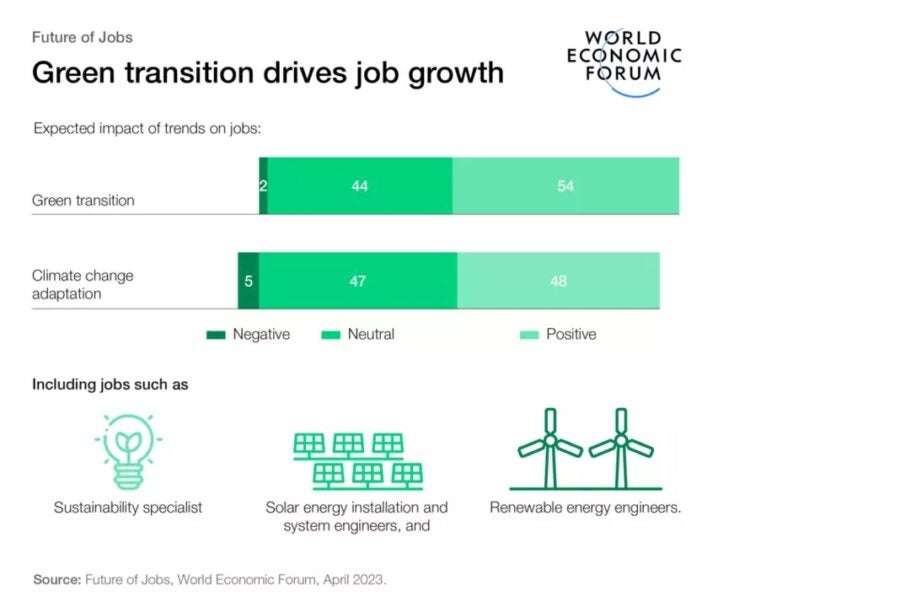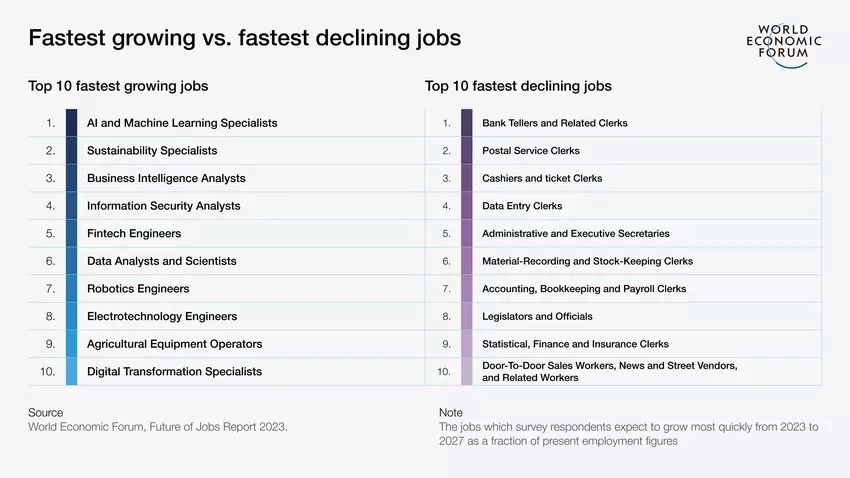There’s long been concern about automation and AI making jobs obsolete, and the release of ChatGPT and similar large language models has only fueled that fire. But AI isn’t the only trend that will affect the future of work, it’s one of several. The World Economic Forum’s Future of Jobs Report 2023, released this week, details the additional factors shaping how jobs and the economy will look in the coming years.
The cliffs notes: Almost a quarter of jobs will change in the next five years, but not just due to AI. In fact, AI and other technologies are expected to have a net positive impact on job creation, while economic issues like inflation and supply shortages will be the biggest wrench in the spokes of the labor market’s growth.
803 companies were surveyed for the report, and they represented a diverse mix of industries and regions. They predicted that of the 673 million jobs in the survey’s dataset, 83 million will be eliminated, while 69 million new jobs will be created. This would yield a net decrease of 14 million jobs, or 2 percent of current employment.
But before we start chanting “death to AI,” let’s dig into the anticipated causes of job growth and elimination. Though the report does show that technology and digitization will cause labor market churn, big data and AI will drive more job growth than anything else, with the most in-demand jobs being data scientists, machine learning specialists, and cybersecurity professionals. Demand for these roles is expected to grow an average of 30 percent by 2027.
There’s a flip side to the coin, though: up to 26 million clerical, record-keeping, and administrative jobs will be eliminated by AI and other digital technologies. 75 percent of the companies surveyed plan to adopt AI systems that will be able to perform these tasks. They’ll need employees to run those systems, of course, which may be why technological literacy was ranked sixth-most important this year, but expected to move up to the top spot in coming years. For now, analytical and creative thinking are the top two most important skills for employees to have (take that, AI!).
Engineering skills will be in high demand in the near future too, particularly those related to energy. For all the talk about transitioning to green energy, the US actually has a shortage of the types of labor needed to make it happen. It’ll be hard to go all-electric without enough electricians, for example. More than half the companies surveyed said they plan to put some amount of investment toward sustainability, climate change mitigation, or the energy transition, and will see corresponding job growth.

The final two areas that will have the highest job demand are, somewhat surprisingly, education and agriculture. With robots and drones that can plant, monitor, and harvest crops, and computer programs that can teach students at any age, you’d think these would industries would be vulnerable to automation and AI. But the report found that jobs in education should grow by about 10 percent (that’s three million new jobs for teachers spanning from grade school all the way through university), and a 15 to 30 percent increase—that’s 4 million new jobs—for agricultural equipment operators, graders, and sorters.
The report forecasts that over 60 percent of workers will require some sort of retraining in the next five years, whether that’s a total overhaul of their current role or just taking their existing skills up a notch. However, only half of workers currently have access to good training. This means companies and governments need to start investing big in reskilling and education.
“Acceleration in digitalization, AI, and automation are creating tremendous opportunities for the global workforce, but employers, governments, and other organizations need to be ready for the disruptions ahead,” said Sander van’t Noordende, CEO of Randstad. “By collectively offering greater skilling resources, more efficiently connecting talent to jobs, and advocating for a well-regulated labor market, we can protect and prepare workers for a more specialized and equitable future of work.”
Image Credit: www_slon_pics from Pixabay
Source: https://singularityhub.com/2023/05/03/a-quarter-of-jobs-will-change-in-the-next-5-years/



